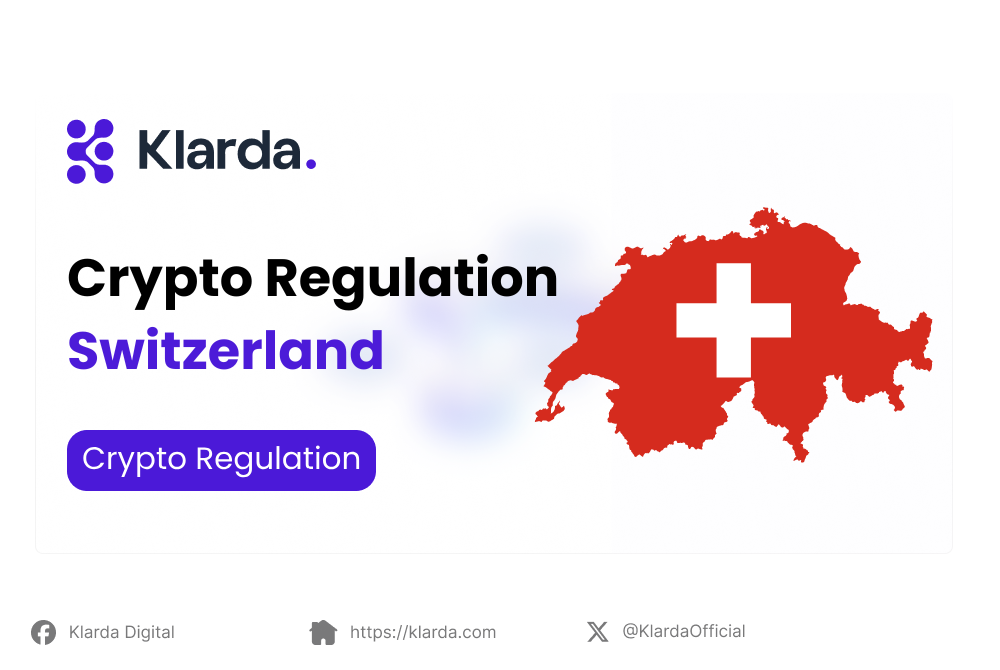Crypto Regulation in Switzerland
Explore “Switzerland crypto regulation“ - an overview of the regulatory authority, who is affected, the regulations in place, and how to obtain authorization
Switzerland, renowned as a global crypto hub, boasts a supportive and regulated environment. This article explores “Switzerland crypto regulation”, covering the regulatory authority, scope, specific rules, and the authorization process, offering insights into the country's crypto-friendly landscape.

KEY TAKEAWAYS
- Switzerland has a well-regulated cryptocurrency environment.
- FINMA is the main regulatory authority.
- Regulations apply to all cryptocurrency entities in Switzerland.
- Key regulations include identity verification and risk management.
- Obtaining FINMA authorization is crucial for compliance.
- Future of crypto regulation in switzerland in 2024
HISTORICAL CONTEXT OF CRYPTO REGULATION IN SWITZERLAND
Early days of crypto in Switzerland
- Switzerland emerged as a pioneer in exploring and experimenting with cryptocurrency and blockchain regulations.
- During this period, the Swiss government demonstrated support for crypto-related projects and businesses.
Zug as a Crypto Pioneer City
- Zug, a trailblazer, embraced Bitcoin for municipal transactions.
- This move positioned Zug as a key player in crypto and blockchain development.
Evolution of Switzerland’s Stance on Cryptocurrencies
- Switzerland progressed by implementing stricter regulations for consumer protection.
- The focus includes a robust legal framework, compliance rules, and vigilant oversight for crypto projects and businesses.
SWITZERLAND'S CRYPTO-FRIENDLY ENVIRONMENT
Switzerland, renowned as a global financial hub, has embraced cryptocurrencies with open arms since 2016. The country's proactive stance in promoting cryptocurrencies for financial transactions has positioned it as a pioneering advocate in the crypto arena. Beyond its reputation in the financial world, Switzerland hosts prominent international organizations such as the Red Cross, the World Trade Organization (WTO), and the Bank for International Settlements (BIS), reinforcing its status as a significant hub for blockchain and cryptocurrency enterprises.
Beyond its allure as a tourist destination, Switzerland boasts a thriving blockchain ecosystem, attracting innovators and businesses dedicated to advancing cryptographic technology. With strong ties to other international blockchain hubs and the implementation of several crypto-friendly regulations, Switzerland has earned recognition as one of the most welcoming destinations for investors and entrepreneurs in the crypto sphere.
Swiss cities actively endorse cryptocurrency usage for various transactions, solidifying Switzerland's ambition to establish itself as a global leader in the cryptocurrency realm. This accommodating environment has made Switzerland a prime destination for those looking to explore the potential of cryptocurrencies and blockchain technology.
WHO IS THE REGULATOR?
The primary regulatory authority overseeing cryptocurrency activities in Switzerland is the Financial Market Supervisory Authority (FINMA). As an independent agency, FINMA is responsible for ensuring the safety and compliance of financial activities within the country, including cryptocurrency-related ventures.
WHO IS AFFECTED?
Entities and individuals affected by crypto regulations in Switzerland include:
- Crypto Businesses
- Cryptocurrency exchanges.
- Crypto wallet providers.
- Blockchain-based companies.
- ICO (Initial Coin Offering) Issuers: Entities conducting ICOs are subject to regulatory scrutiny.
- Financial Institutions:Traditional banks and financial institutions involved in crypto activities.
- Investors and Consumers: Individuals engaging in crypto transactions and investments.
- Other Market Participants: Service providers, legal entities, and professionals operating in the crypto space.
WHAT ARE THE SWITZERLAND CRYPTO REGULATION?
Depending on the specific virtual assets that entities handle, they may need to adhere to various regulatory frameworks in Switzerland. These regulations encompass:
Anti-Money Laundering Act (AMLA)
- Requires financial intermediaries to prevent money laundering.
- Applies to entities handling virtual assets.
Banking Act
- Applies when virtual assets are considered deposits.
- Issuers of such tokens must follow the Banking Act.
Collective Investment Schemes Act
- For entities raising virtual assets through collective investment.
- Specifies regulatory requirements for these asset tokens.
Financial Services Act and Financial Institutions Act
- Govern public offerings of securities, potentially including tokens.
- Enforces regulations for entities involved in public offerings.
FUTURE OF CRYPTO REGULATION IN SWITZERLAND IN 2024
Cryptocurrency activities in Switzerland are currently considered legal, with limited regulation primarily related to anti-money laundering measures. Switzerland, known for its progressive approach to finance and technology, has positioned itself as a leading hub for blockchain innovation. Looking ahead to 2024, we can expect Switzerland to continue refining its regulatory framework to solidify its global leadership in cryptocurrency adoption.
Additionally, it's worth noting that as of April 20, 2023, Europe has taken significant steps toward regulating cryptocurrencies on a Union-wide basis. The European Parliament has adopted the Markets in Crypto Assets (MiCA) Regulation, set to come into effect in 2024, signaling a broader regulatory landscape for cryptocurrencies across the European Union.
FAQS
Here are some frequently asked questions related to cryptocurrency regulations in Switzerland:
Why Is Switzerland Considered An International Cryptocurrency Hub?
Switzerland is considered a global cryptocurrency hub due to its early adoption, supportive regulatory environment, and initiatives like Zug accepting Bitcoin.
What Specific Measures Do I Need To Take To Comply With Cryptocurrency Regulations In Switzerland?
To comply, businesses need to adhere to FINMA regulations, including obtaining the necessary licenses and ensuring compliance with AML (Anti-Money Laundering) and KYC (Know Your Customer) requirements.
How Can I Check If A Cryptocurrency Company Is Approved By Finma?
To check if a cryptocurrency company is approved by FINMA, refer to FINMA's official website for a list of authorized entities.
What Are The Regulatory Requirements For Ico Projects In Switzerland?
ICO projects in Switzerland must adhere to FINMA guidelines, including providing comprehensive disclosure, classifying tokens, and ensuring compliance with AML regulations.
In conclusion, Switzerland crypto regulation, guided by FINMA, achieve a balance between innovation and consumer protection. Applicable to all crypto entities, these rules emphasize identity verification, risk management, and authorization from FINMA for compliance. Switzerland's status as a crypto hub stems from its dedication to a secure and transparent crypto environment, attracting enthusiasts and businesses to its regulatory framework.
Updated 9 months ago